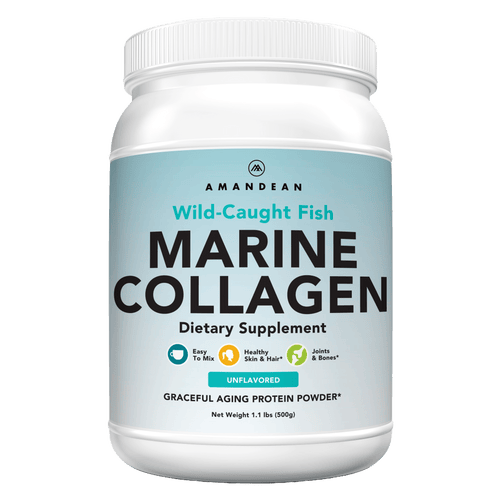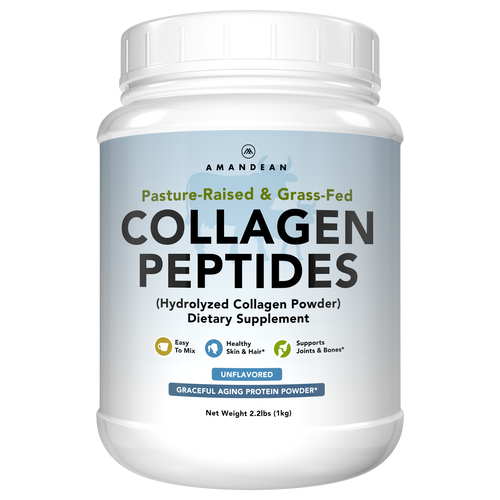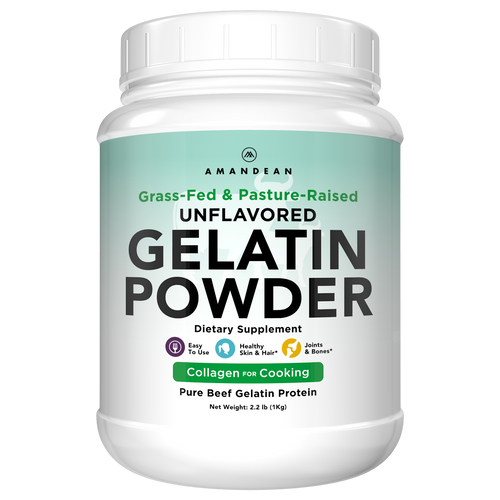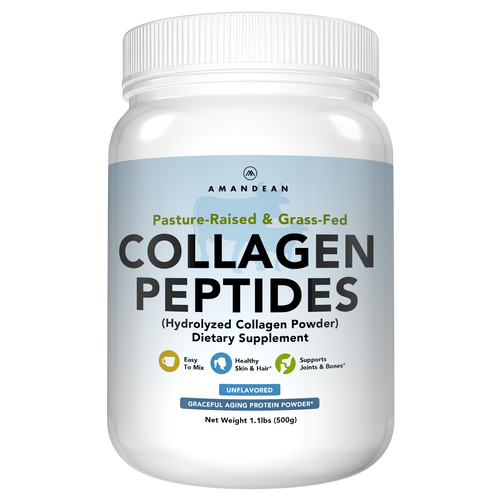Your Cart is Empty
Why Vegans Should Consider Taking Creatine
Find out why creatine is better for vegans! Boost your wellness game and unlock peak performance with Amandean's premium supplements...
When it comes to aging gracefully, collagen isn’t just a beauty buzzword. It’s a foundational protein that helps keep your skin smooth, your joints flexible, and your hair and nails strong.¹ For women, especially those over 25, collagen becomes even more essential as natural production declines yearly.² If you're searching for the best collagen for women, you're likely looking for something more than empty claims – you want clinically supported benefits, clean and sustainable sourcing, and real results.
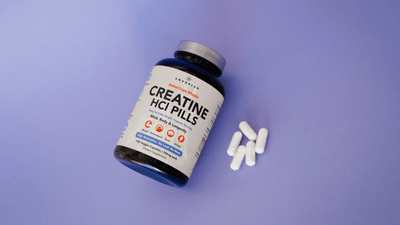
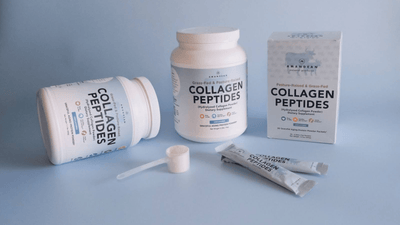
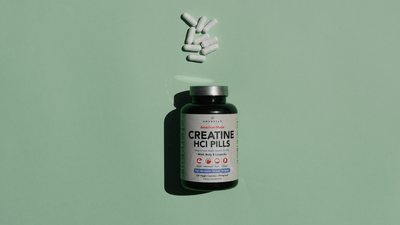
Collagen is the behind-the-scenes protein that keeps your body running like a well-oiled (and well-moisturized) machine. Collagen isn’t just a trendy ingredient making cameos in skincare ads; it’s the most abundant protein in your body! You’ll find it in your skin, hair, nails, joints, bones, and gut lining.¹⁻² Think of it as the structural glue that holds everything together and keeps things feeling smooth and firm.
So, why all the collagen buzz in women’s wellness spaces? Well, collagen is composed of amino acids (primarily glycine, proline, and hydroxyproline) that contribute to the structural integrity of connective tissues throughout the body.¹ For women, natural collagen declines with age, especially during and after menopause.¹ This slowdown is closely tied to hormonal shifts, which may accelerate collagen breakdown and show up in fine lines, dull skin, thinning hair, or joint stiffness ¹ – not precisely what you’d call graceful aging. Because collagen is so deeply tied to the body’s structural framework, supporting its production becomes an integral part of a holistic approach to long-term wellness.
Not all collagen supplements are the same. Our Grass-Fed Bovine Collagen Peptides, available in 500g and 1kg sizes, and Marine Collagen Peptides are hydrolyzed for better absorption. Bovine collagen, sourced from 100% pasture-raised South American cows, supports gut health and joint strength with longer-chain peptides. In contrast, our marine collagen, double-hydrolyzed from sustainable fish, offers smaller peptides for enhanced bioavailability. Both are free of sugars, fillers, or preservatives, perfect for mixing into coffee, smoothies, or your daily drink.
Once consumed, these smaller peptide chains are more easily absorbed through the digestive tract and transported throughout the body, where they may help stimulate natural collagen production. This process has been studied in peer-reviewed clinical research, where consistent supplementation has shown potential in supporting skin hydration, elasticity, and joint comfort in aging populations.¹
Collagen shines with healthy habits like resistance training, quality sleep, and hydration. Pairing it with a vitamin C supplement, like our Liposomal Vitamin C, boosts its effectiveness, as vitamin C supports collagen production. While not a cure-all, thoughtfully chosen collagen can be a key part of your long-term wellness routine.
If you’ve ever dipped a toe into the world of collagen, you’ve probably realized something quickly: There are many kinds to choose from. Different types serve different functions, and while their names might blur together, their roles in your body are anything but interchangeable. Let’s decode the top types and determine which are most relevant for your beauty and wellness goals.
Type I collagen is a key player in your body, making up 80-90%¹ of its collagen in skin, bones, tendons, and connective tissue, supporting firmness and hydration for graceful aging. Amandean’s Marine Collagen Peptides, sourced from sustainable fish, are double-hydrolyzed for superior absorption, delivering 19 amino acids and 10g of protein per serving. Perfect for skin, hair, and nail health, it’s digestible, clump-free, and easy to mix into coffee, tea, juice, yogurt, or water – versatile for your daily routine.
Type II collagen is a key structural protein found in cartilage. It’s less about aesthetics and more about movement, so it may help support joint function and mobility.¹ Many Type II collagen products are derived from chicken cartilage. If your main goal is joint-focused, a product with Type II collagen might complement a broader collagen routine.
Following the focus on joint health, we haven’t produced a Type II collagen product due to challenges in sourcing a clean, high-quality version. Once collagen is hydrolyzed, distinguishing between types becomes tricky. Since collagen supplements encourage your body to produce more collagen overall, we haven’t found clear evidence that a Type II collagen supplement specifically boosts Type II collagen production for joints. With high bioavailability, our Marine Collagen Peptides remain a versatile choice for supporting general collagen synthesis.
Often found alongside Type I in our Collagen Peptides Powder (500g), Type III collagen supports the structure of muscles, arteries, and internal organs.² It helps maintain the elasticity of these tissues, contributing to overall physical resilience. Suppose you’d like to stimulate collagen production further and provide maximum absorption. In that case, we recommend consuming this product with a source of vitamin C. Citrus fruits, strawberries, broccoli, and Brussels sprouts are all fantastic options at any time of the day. We have a whole lineup of delicious collagen-infused recipes for you (even ones for your furry best friend), so feel free to have fun with it and maybe find a new favorite recipe or two!
Collagen's effectiveness isn’t just about the type; it’s also about where it comes from.
Collagen comes in many forms, and the best option depends on what you're hoping to support: skin appearance, joint mobility, muscle recovery, or all of the above. Amandean’s clean, bioavailable collagen lineup makes it easier to choose based on your wellness priorities without memorizing a science textbook.
Feeling lost in a sea of collagen options? You’re not alone. It's easy to get overwhelmed between bovine vs. marine, hydrolyzed vs. non-hydrolyzed, and ingredient labels that look more like lab notes. But choosing the best collagen for women doesn’t have to be complicated. You just need to know what to look for (and what to avoid).
Read also:
Sources:
While collagen supplements offer a highly concentrated, bioavailable protein boost, whole foods can still play a supporting role. Bone broth is the reigning queen, rich in gelatin and amino acids like glycine and proline. Other animal-based contenders include chicken skin, salmon (skin included!), egg whites, and pork rinds.
Collagen comes only from animals, so plants can’t provide true “vegan collagen.” But vegan collagen boosters can help your body make more of its own. Foods like citrus, berries, leafy greens, avocados, and nuts offer vitamin C, zinc, and antioxidants to support collagen production. At Amandean, we’re upfront: if it’s not real collagen, we say so. Our Liposomal Vitamin C, a liquid vegan formula with 1000mg per dose, maximizes absorption to boost collagen synthesis naturally. No shortcuts, just honest wellness.
There’s no official starting time, but many women notice a dip in natural collagen production in their late 20s or early 30s. Signs like duller skin, reduced elasticity, or changes in hair and nails may prompt the shift. That said, it’s never too early (or too late) to show your skin and joints a little extra love.
Research suggests 10g of hydrolyzed collagen peptides daily to support skin, hair, nails, and joints, but factors like age, diet, and exercise may call for larger servings. Check your product label’s serving size and consult your healthcare provider for personalized advice, especially if you have health conditions. For details on Amandean collagen, refer to our product guides.
Biochemically? Nope. Collagen is collagen. Its structure doesn’t change based on your gender. What does vary is how it’s marketed. Regardless of packaging, clean, well-sourced collagen peptides can benefit anyone looking to support skin appearance, joint health, or overall wellness.1 At Amandean, we skip the fluff and focus on science-backed, high-quality collagen for every body.
Absolutely. It’s always smart to read ingredient labels carefully, especially if you have known sensitivities. Collagen is typically sourced from fish (marine), cows (bovine), or chickens, so if you have allergies to any of those, double-check the origin before diving in.
Amandean’s collagen products are non-GMO and free of dairy, gluten, soy, sugar, and artificial additives. But if you’re allergic to fish or beef, select the appropriate product or consult your doctor before use. Your safety is our priority.
